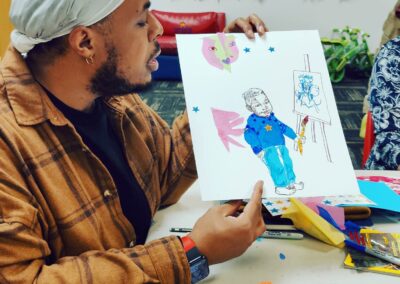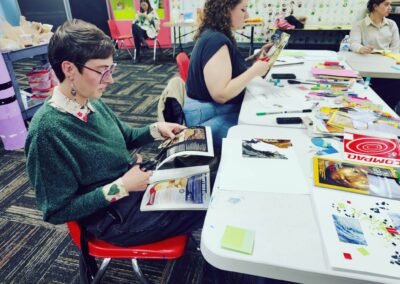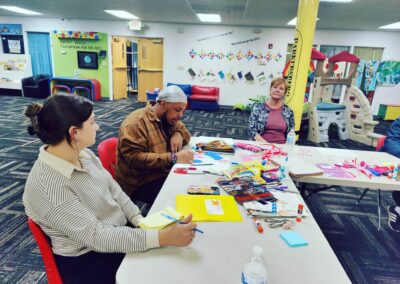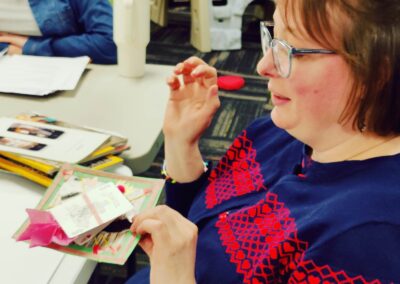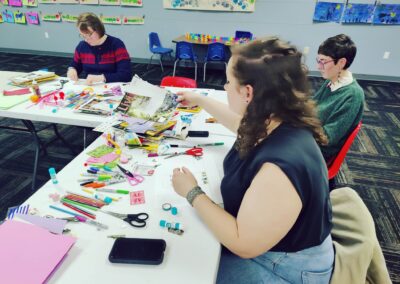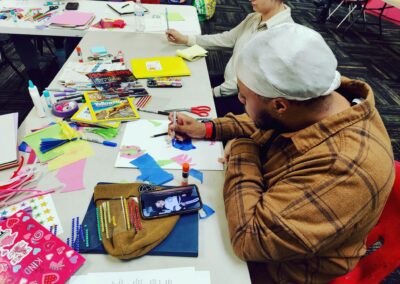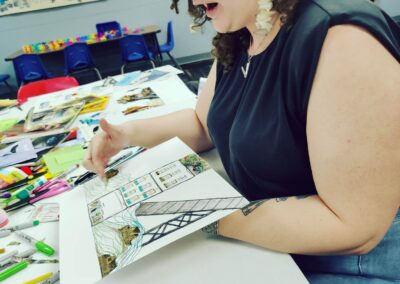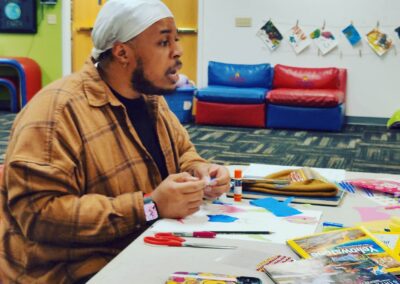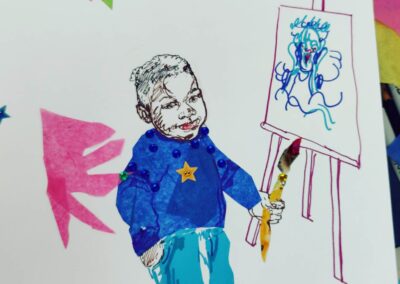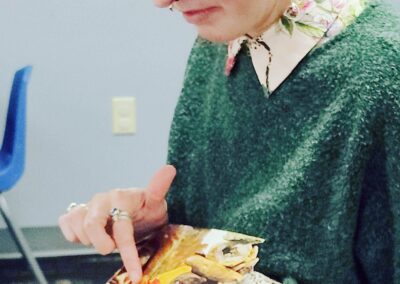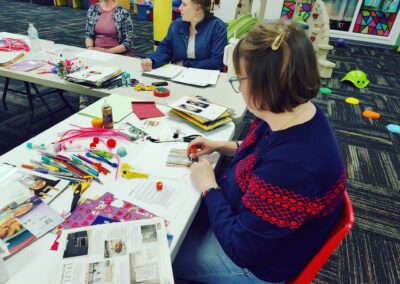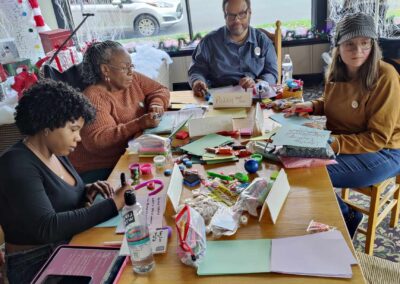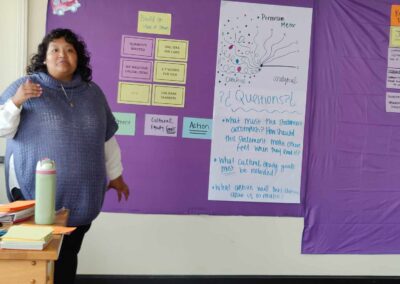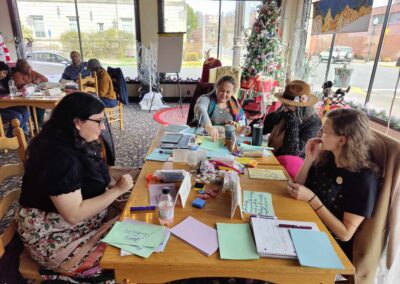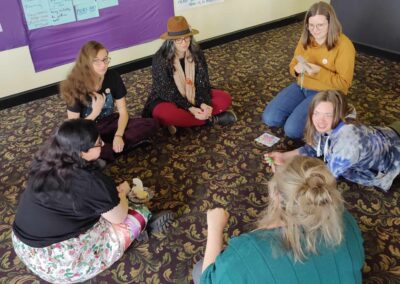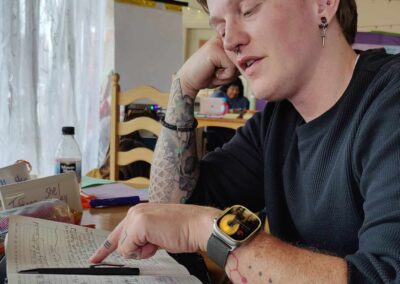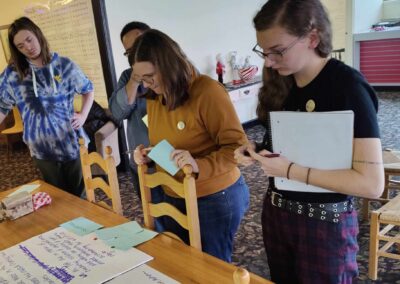Cultural Equity Research & Action
As a statewide arts organization, the Tamarack for the Arts (TFA) is examining cultural equity in the arts in WV using participatory action research. Participatory action research (PAR) is an approach to research that prioritizes the value of experiential knowledge for identifying needs arising from problems caused by unequal and harmful social systems and then envisioning thriving futures with those who have experienced harm, othering, or marginalization and building pathways for implementing alternatives, breaking down barriers, and increasing access to existing resources.
In other words, TFA is learning from and planning with the artists and creatives across WV about what big changes need to happen for them to have happy, thriving, successful futures as artists in this state. More and more, the artists themselves are identifying and implementing impactful actions they can take locally to contribute to building the arts ecosystem in WV.
Asset Mapping
TFA is mapping the various cultural and artistic resources across the state. This data collection has been a collaborative effort with amazing interns from West Virginia University.
Listening Sessions with WV Artists
In 2023, TFA staff in collaboration with Dr. Erin Brock-Carlson, WVU, and Olivia Wertz, WVU Ph.D. candidate and TFA Cultural Equity Intern planned and hosted 12 listening sessions. Those sessions were held in Wheeling, Morgantown, Elkins, Parkersburg, Charleston, Beckley, West Huntington, Welch, Princeton, and White Sulphur Springs. Additionally, we held a listening session with TFA’s Creative Entrepreneur Fellows and hosted a session at the Appalachian Studies Conference.
Our methodology for the listening sessions was to provide a small, intimate group with an art activity that they could work on individually as they responded to prompts given by the facilitator with the option to ignite rich discussion between the participants. Collaging was used as the art form. Participants were asked to consider their past, present, and future of living in WV as an artist. Some of the discussion prompts included: “Do you have a strong arts community?” “What’s missing from the arts community in your area?” “Who’s not currently at the table who should be in regards to arts in your community?” and questions about arts business and access to resources.
In Fall of 2023, TFA developed a Cultural Equity Advisory Committee as part of our commitment to participatory action and decision-making that is fueled by a diverse group of artists who desire equitable and just futures for all.
From October 2023 to January 2024, the Cultural Equity Advisory Committee and TFA staff participated in a series of workshops, facilitated by Mizari Suárez, to develop an organizational cultural equity statement and equity action goals. Mizari Suárez, a long-time advocate and community organizer, started organizing with an immigrant-led student organization in Kentucky. Her organizing shifted to an intersectional approach and started organizing around housing, local policing, and other social justice-related issues. With Mizari’s wonderful facilitation skills, the Cultural Equity Advisory Committee developed a cultural equity statement to present to TFA’s Board of Directors. The cultural equity statement and goals will be used as a framework for the ways TFA moves forward in our work and service to artists from here on out.
Cultural Equity Advisory Committee Members:
- Sassa Wilkes
- Doris Fields, aka Lady D.
- Julia Pritt
- Shannon Shine
- Mary Roy
- Emily Prentice
- Kabrea James
- Susan Feller
- Michael Tierney
- Griffin Nordstrom
- Tiffany Pyette
- Kylie Proudfoot-Payne
Statewide WV Artist Survey
In summer of 2023, TFA launched a statewide artists survey so that we could get a better understanding of the artists we are surveying and what their needs are. This survey asked about gender identity, age, education, income, health insurance, challenges with being an arts entrepreneur or small business owner, and which kinds of support, resources, or technical assistance participants would most like to see made available to them regarding their arts career and arts businesses. TFA received 309 responses.
Focus Group Research
As a follow up to the listening session, in Spring of 2024, TFA staff, Dr. Erin Brock-Carlson, and Jonna Leavitt, WVU intern, will conduct focus groups in three of the communities in which listening sessions were held last year: Wheeling, Elkins, and West Huntington. These focus groups and the work surrounding it will dive deeper into local assets, resources, and relationships. More to come about this later this year.
While we are still analyzing the data from the survey with Dr. Brock-Carlson and Jonna Leavitt, WVU intern, here are a few highlights from responses we got from artists we surveyed:
When asked, “Which of the following describes your total yearly income? This refers to only your yearly income, not your household’s yearly income,” out of 309 responses,
-
- 71.5% of the participants responded they earn an income of $49,999 or less per year
- 24.9% of participants responded they earn $20,000 to $34,999 per year
- 25.9% of participants responded they earn less than $20,000 per year
When asked to rate their agreement with the following statement: “I feel confident I can meet my basic financial obligations,” out of 309 responses,
-
- 28.2% of participants responded “5,” which can be interpreted that they feel highly confident they can meet their basic financial obligations
- 20.7% of participants responded “4,” which can be interpreted that they feel fairly confident that they can meet their basic financial obligations
- 29.4% of participants responded “3,” which can be interpreted that they feel somewhat confident they they can meet their basic financial obligations
- A total of 21.7% of participants responded “1” or “2,” which can be interpreted as they have no or very little confidence in being able to meet their basic financial obligations
The top 6 responses when answering the question, “What kinds of support do you need right now?” are as follows (respondents could mark all that applied)
-
- Salaries/wages (30.7%)
- Studio access (22.3%)
- Equipment access (22%)
- Digital Communications Tools/Resources (19.1%)
- Mental Health Care (21.4%)
- Medical Health Care (16.2%)
Out of 309 participants, 57% responded they do not consider themselves full time artists.
When asked “Do you make a livable income solely based on art-related profits, or do you supplement your arts-driven income via other financial means?” out of 309 responses
-
- 62.8% of participants selected the response “My arts-driven income is supplemented by other financial means (i.e. another job).”
- 18.8% of participants selected the response “My income is solely based on arts-related profits.”
- 18.4% of participants selected the response “No income is brought in from my art.”
When asked “Do you consider yourself an arts-based small business owner?” out of 309 responses
-
- 49.8% responded “Yes.”
- 35.6% of participants responded “No.”
- A total of 14.6% of participants responded “Maybe” or “Not sure.”
Following that question, participants were asked, “If you answered ‘No,” “Maybe,” or “Not sure,” do you want to be an arts-based small business owner?” Out of 177 responses
-
- 42.4% of the participants responded “Yes.”
- 28.2% of the participants responded “Maye.”
- 8.5 % of the participants responded “Not sure.”
- 20.9% of the participants responded “No.”
Thanks
Thank you for supporting the arts in West Virginia.


